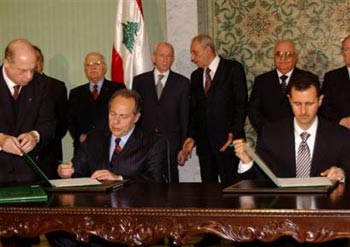
Lebanese President Emile Lahoud, left, and his Syrian
counterpart Bashar Assad sign documents during a meeting in Damascus, Syria,
Monday March 7, 2005. The presidents met in Damascus to outline plans for a
withdrawal of the Syrian military. While announcing that the troops would
redeploy to the eastern Bekaa Valley closer to the Syrian border by the end of
March, they were vague on the timing of a complete withdrawal from
Lebanon. (AP Photo)
Syria and Lebanon agreed Monday on a partial Syrian pullout from Lebanon
while reasserting their brotherly ties.
Syrian President Bashar al-Assad and his Lebanese counterpart Emile Lahoud
announced at a joint supreme council meeting that Syrian troops would be
redeployed to Lebanon's eastern Bekaa Valley.
The maneuver would be conducted by the end of March and the two sides would
then decide the timetable of a final pullout, a joint statement said.
It added a joint military commission would then determine within one month
the size and length of stay of the remaining forces after the redeployment.
The move came amid mounting international pressure on Syria to pull out its
14,000 troops from neighboring Lebanon, over which Syria wields a significant
political influence.
Anti-Syria emotions have running high in Lebanon and a popular protest late
last month forced the pro-Syria cabinet to resign. The outpouring of opposition
was triggered by the assassination of former Lebanese Prime Minister Rafik
Hariri, who was killed in amassive bombing attack on Feb. 14.
Hariri, a long-time Lebanese prime minister, resigned last October over
disputes with incumbent President Lahoud, a Damascus favorite.
Hariri fell foul of Damascus after Syria threw its weight behind a
constitution amendment to extend Lahoud's term. Lebanese opposition accused
Syria of playing a part in the killing of Hariri, a major architect of Lebanon's
postwar revival and an opponent to Syria's dominance, but Damascus denied any
involvement.
Moreover, the statement said, "The two sides affirmed their commitment to the
Taif Accord and its mechanism ... and the irrespect to all resolutions issued by
the international legitimacy including Resolution 1559."
The Taif Accord was signed in 1989, ending Lebanon's 1975-1990 civil war and
spelling out a Syrian pullout from its tiny neighbor. The United Nations passed
Resolution 1559 last September,sponsored by the United States and France, urging
all foreign forces to withdraw from Lebanon, implicitly referring to Syria.
The statement reaffirmed close ties between the two countries,vowing to
"enhance the course of mutual cooperation and coordination and to continue the
implementation of their pact and agreements."
"They also reiterated their commitment to joint strategic fixed principles in
the face of current and future challenges and in seeking to achieve a just and
comprehensive peace," said the statement.
Assad declared on Saturday a two-phased pullout. "Syrian troops will
completely pull back to Bekaa valley in eastern Lebanon and then to the
Syrian-Lebanese border," Assad said in a parliament address, but stopping short
of a clear timetable.
The withdrawal would start "immediately" after the meeting,Lebanese Defense
Minister Abdul Rahim Mrad said Sunday. In Lebanon, Syrian army forces were seen
to have started packing and leaving some mountain positions near Beirut.
A military convoy of seven trucks and two jeeps headed toward an area near
the village of Bouarej on the main Beirut-Damascus highway linking the capital
to Bekaa, a valley stretching along the borders with Syria.
The United States, a leading opponent of Syrian presence in Lebanon,
dismissed the withdrawal plan just hours after the meeting, saying Syrians
forces must pull out immediately.
"We want to see the complete withdrawal, no half measures,"White House
spokesman Scott McClellan said, echoing Washington's repeated demand for a full
and quick pullout of Syrian troops and intelligence services.



